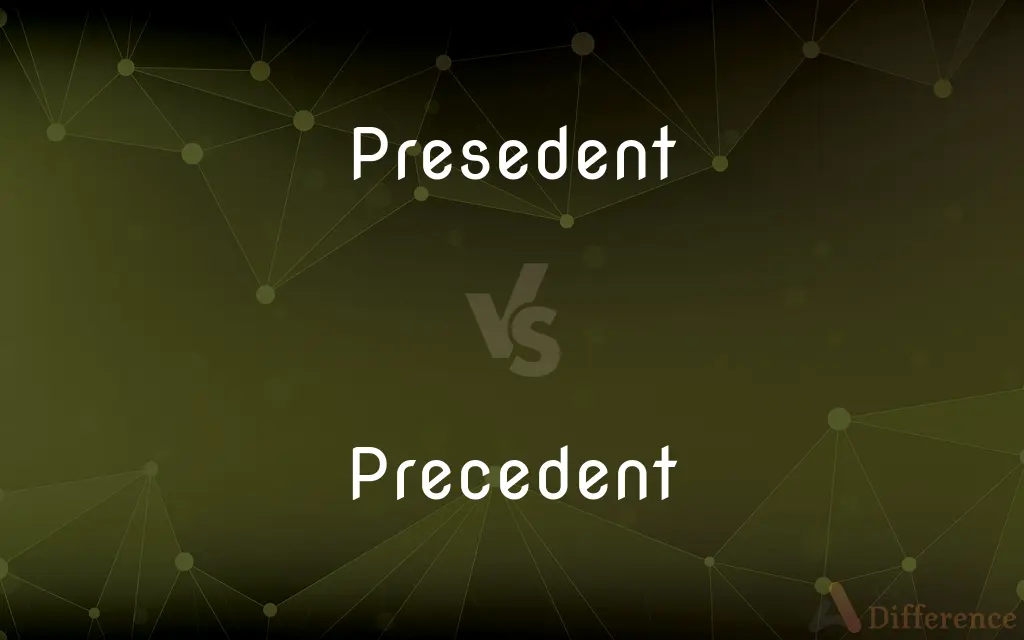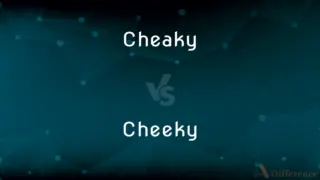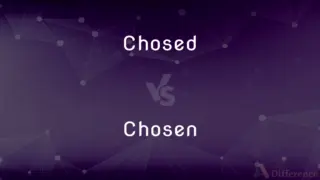Presedent vs. Precedent — Which is Correct Spelling?
Edited by Tayyaba Rehman — By Fiza Rafique — Updated on April 4, 2024
Presedent is incorrect. The right spelling is Precedent, which refers to an earlier event or action serving as an example or guide.

Table of Contents
Which is correct: Presedent or Precedent
How to spell Precedent?

Presedent
Incorrect Spelling

Precedent
Correct Spelling
ADVERTISEMENT
Key Differences
Think of the phrase "set a precedent" to recall the correct spelling.
Match "precedent" with "antecedent"; both have similar endings and relate to prior events.
Remember that "president" is a title, while "precedent" is about prior instances.
The word "precede" is in "precedent," both referring to things that come before.
"Cede" means to give up or yield; "precedent" relates to decisions that yield a standard.
ADVERTISEMENT
How Do You Spell Precedent Correctly?
Incorrect: They tried to find a similar presedent to justify their actions.
Correct: They tried to find a similar precedent to justify their actions.
Incorrect: He was following the presedent set by the previous administration.
Correct: He was following the precedent set by the previous administration.
Incorrect: The court ruled based on a faulty presedent.
Correct: The court ruled based on a faulty precedent.
Incorrect: There's no presedent for this kind of research in our field.
Correct: There's no precedent for this kind of research in our field.
Incorrect: His decision was not based on any legal presedent.
Correct: His decision was not based on any legal precedent.
Precedent Definitions
An earlier event or action regarded as an example or guide.
The court's decision set a legal precedent.
A previously decided case serving as a legal guide.
Lawyers often cite precedents in their arguments.
An established custom or practice.
The precedent of shaking hands dates back centuries.
A standard or model established by past occurrences.
The artist's work became a precedent for modern painters.
Any act or decision that serves as a guide for future situations.
The policy set a new precedent for employee benefits.
An act or instance that may be used as an example in dealing with subsequent similar instances.
(Law) A judicial decision that is binding on other equal or lower courts in the same jurisdiction as to its conclusion on a point of law, and may also be persuasive to courts in other jurisdictions, in subsequent cases involving sufficiently similar facts.
Convention or custom arising from long practice
The president followed historical precedent in forming the Cabinet.
Preceding.
An act in the past which may be used as an example to help decide the outcome of similar instances in the future.
(legal) A decided case which is cited or used as an example to justify a judgment in a subsequent case.
An established habit or custom.
The aforementioned (thing).
The previous version.
(obsolete) A rough draught of a writing which precedes a finished copy.
Happening or taking place earlier in time; previous or preceding.
Coming before in a particular order or arrangement; preceding, foregoing.
To provide precedents for.
To be a precedent for.
Going before; anterior; preceding; antecedent; as, precedent services.
Something done or said that may serve as an example to authorize a subsequent act of the same kind; an authoritative example.
Examples for cases can but direct as precedents only.
A preceding circumstance or condition; an antecedent; hence, a prognostic; a token; a sign.
A rough draught of a writing which precedes a finished copy.
A judicial decision which serves as a rule for future determinations in similar or analogous cases; an authority to be followed in courts of justice; forms of proceeding to be followed in similar cases.
An example that is used to justify similar occurrences at a later time
(civil law) a law established by following earlier judicial decisions
A system of jurisprudence based on judicial precedents rather than statutory laws;
Common law originated in the unwritten laws of England and was later applied in the United States
A subject mentioned earlier (preceding in time)
Preceding in time, order, or significance
Precedent Meaning in a Sentence
The company’s policy on remote work became a precedent for others in the industry.
The judge's decision set a new precedent for future cases.
Finding a precedent in law is crucial for building a strong case.
The teacher used a historical event as a precedent to explain current events.
Innovators often break with precedent to create something truly new.
By setting a good precedent, leaders can inspire future generations.
Looking for a precedent, the lawyer combed through old case files.
The policy set a bad precedent, leading to many unintended consequences.
Without a clear precedent, the committee found it hard to make a decision.
Historians study ancient civilizations to understand the precedent for modern practices.
The precedent established by the court's ruling was controversial.
In literature, authors often challenge the precedent to produce unique works.
Their peaceful protest set a precedent for non-violent resistance.
The precedent for such architectural designs can be traced back to the Renaissance.
This legal precedent has influenced many subsequent decisions in court.
The town’s response to the disaster would serve as a precedent for other communities.
The precedent for celebrating such festivals can be found in ancient cultures.
Critics argue that this legal precedent limits personal freedoms.
The athlete's training regimen set a precedent for others to follow.
Adhering to precedent can ensure fairness and consistency in decision-making.
The scientist cited a precedent study to support her hypothesis.
Precedent Idioms & Phrases
Set a precedent
To establish a standard or norm that others will follow.
The new policy set a precedent for how we handle remote work.
Break with precedent
To do something in a way that has not been done before.
The company broke with precedent by allowing employees to design their own schedules.
Establish a precedent
Similar to setting a precedent, it means to create an example for others to follow.
The court’s ruling will likely establish a precedent for future cases of this nature.
Without precedent
Something that has never happened or been done before.
The technological breakthrough was without precedent in the field of medicine.
A dangerous precedent
A situation or decision that could lead to negative outcomes if used as an example for future actions.
Critics argue that the new policy sets a dangerous precedent for privacy rights.
Follow precedent
To do something the same way it has been done in the past.
The builders decided to follow precedent when constructing the new bridge.
Challenge the precedent
To question or contest an established way of doing something.
The young lawyer challenged the precedent, arguing for a more modern interpretation of the law.
Common Curiosities
Which vowel is used before Precedent?
Any vowel can come before "precedent" depending on the sentence and context.
What is the verb form of Precedent?
The verb form related to "precedent" is "precede."
What is the root word of Precedent?
The root word is "precede."
Which conjunction is used with Precedent?
Any conjunction can be used with "precedent" based on its position and function in a sentence.
What is the pronunciation of Precedent?
Precedent is pronounced as /ˈprɛsɪdənt/.
Is Precedent an adverb?
No, "precedent" is not an adverb.
Why is it called Precedent?
It's called "precedent" because it refers to something that precedes or serves as a model for future occurrences.
Is Precedent a negative or positive word?
"Precedent" is neutral in connotation.
What is the plural form of Precedent?
The plural form is "precedents."
Is Precedent an abstract noun?
Yes, "precedent" is an abstract noun as it represents an idea or concept.
Is Precedent a noun or adjective?
"Precedent" can serve as both a noun and an adjective.
Is Precedent a vowel or consonant?
"Precedent" is a word consisting of both vowels and consonants.
Is Precedent a countable noun?
Yes, "precedent" is countable.
Is the Precedent term a metaphor?
Not inherently, but it could be used metaphorically in specific contexts.
What is the singular form of Precedent?
The singular form is "precedent."
Which preposition is used with Precedent?
Prepositions like "by," "with," or "under" can be used with "precedent" depending on context.
What is the opposite of Precedent?
There isn't a direct opposite, but "anomaly" or "exception" could serve as antonyms in some contexts.
What is the first form of Precedent?
The base form is "precede."
Which article is used with Precedent?
"A" or "the" can be used with "precedent," depending on the context.
Is the word Precedent a gerund?
No, "precedent" is not a gerund.
What is a stressed syllable in Precedent?
The first syllable, "pre," is stressed.
What part of speech is Precedent?
"Precedent" is primarily a noun but can also be an adjective.
What is another term for Precedent?
Another term is "standard" or "model."
Is Precedent a collective noun?
No, "precedent" is not a collective noun.
Is the word “Precedent” a Direct object or an Indirect object?
"Precedent" can serve as either, depending on its use in a sentence.
What is the second form of Precedent?
There isn't a traditional second form as "precedent" is primarily a noun.
How many syllables are in Precedent?
"Precedent" has three syllables.
How do we divide Precedent into syllables?
prec-e-dent.
Which determiner is used with Precedent?
Determiners like "this," "that," "my," and "our" can be used with "precedent."
What is the third form of Precedent?
There isn't a traditional third form as "precedent" is primarily a noun.
How is Precedent used in a sentence?
"The judge's ruling was based on a similar precedent from a past case."
Is the word Precedent imperative?
No, "precedent" is not imperative.
Share Your Discovery

Previous Comparison
Cheaky vs. Cheeky
Next Comparison
Chosed vs. ChosenAuthor Spotlight
Written by
Fiza RafiqueFiza Rafique is a skilled content writer at AskDifference.com, where she meticulously refines and enhances written pieces. Drawing from her vast editorial expertise, Fiza ensures clarity, accuracy, and precision in every article. Passionate about language, she continually seeks to elevate the quality of content for readers worldwide.
Edited by
Tayyaba RehmanTayyaba Rehman is a distinguished writer, currently serving as a primary contributor to askdifference.com. As a researcher in semantics and etymology, Tayyaba's passion for the complexity of languages and their distinctions has found a perfect home on the platform. Tayyaba delves into the intricacies of language, distinguishing between commonly confused words and phrases, thereby providing clarity for readers worldwide.


































